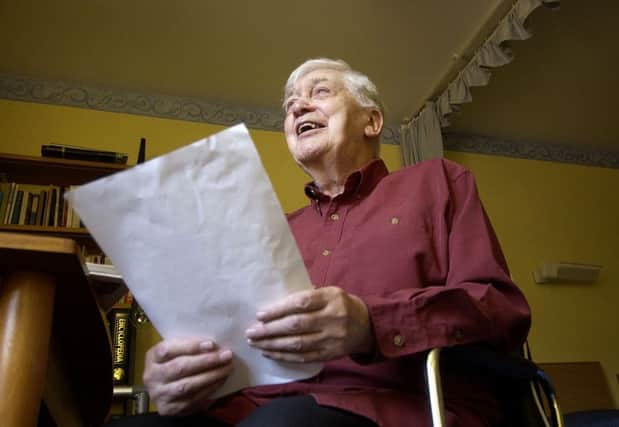Plan for online Edwin Morgan archive faces copyright setback


So it was no surprise that Edwin Morgan approved the creation of a digital collection of his unpublished work before his death in 2010.
He had hoped his scrapbooks, correspondence and handwritten drafts would be publicly available during his lifetime.
Advertisement
Hide AdAdvertisement
Hide AdSince then, Morgan’s estate and the University of Glasgow - where he was a student and lecturer - have tried to make his unpublished works accessible to the rest of the world.
Now an online resource has been launched explaining why obstacles in current copyright law has made the digitisation of cultural heritage collections, such as Morgan’s, virtually impossible.
The resource - www.digitisingmorgan.org, has been developed by a team from the University of Glasgow and Queen’s University, Belfast.
It has been hailed as the first major UK study examining the legal and financial challenges of digitising cultural heritage collections, particularly those from the mid- to late 20th century.
The difficulties pertain particularly to what are described as “orphan” works – works that are still protected by copyright law but for which the owner or owners cannot be identified or located.
Kerry Patterson, project officer at Glasgow, warned current copyright regulations were “preventing the digitisation of cultural heritage collections”.
“If permissions cannot be secured because rightholders cannot be contacted, institutions may simply avoid socially beneficial uses of these ‘orphans’, preferring instead to deal with material for which copyright has expired or is easy to clear,” she said.
“But, when decisions about the digitisation of heritage collections are shaped by the copyright status of the material itself, this skews the digital cultural record.”
Advertisement
Hide AdAdvertisement
Hide AdThere is currently a twin-track approach to the problem of orphan works in the UK - an exception which implements the EU Orphan Works Directive 2012 and the Orphan Works Licensing Scheme (OWLS).
Both depend upon conducting a diligent search for every single orphan work that is to be digitised, regardless of the nature and scale of the project.
Patterson added: “For anything other than small-scale digitisation initiatives, the long-term efficacy and relevance of both schemes appear fatally compromised by the demands of diligent search”.
“With respect to the 16 scrapbooks created by Edwin Morgan, we estimate that it would take one researcher over eight years to undertake the diligent search activity alone, at a cost of more than £185,000.”
Diligent search and mass digitisation are “fundamentally incompatible, however light-touch the nature of the diligent search obligation”, she added.
As for the Edwin Morgan scrapbooks, they will, says Patterson, “remain accessible only within the physical confines of the University Library building for the foreseeable future, apart from a selection of the pages that we digitised for this project”.
“In this respect, they evidence the very real phenomenon of the so-called 20th century black hole. Because copyright status shapes selection processes regarding the digitisation of heritage materials, collections containing work from the mid- to late 20th century are less likely to be digitised for public consumption. In short, our digital historic record is skewed towards material created in the 19th and early 20th century, material that resides in the public domain.”